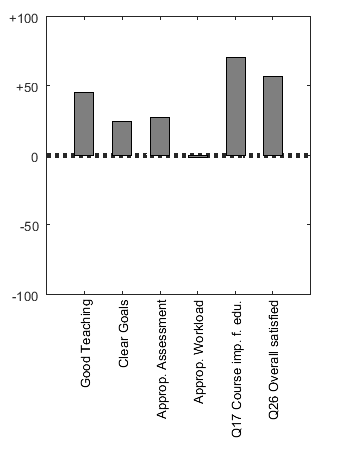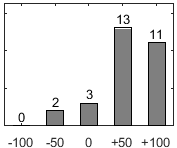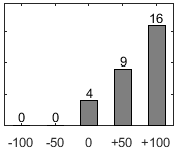Report Course Evaluation, EDAN10
Basic facts
| Course name | Configuration Management |
| Course code | EDAN10
Course syllabus |
| ECTS credits | 7.5 |
| Year | 201617 |
| Study period the course was finished | HT_LP2 |
| Programme | all |
| Registrated students | 57 |
| Number and share of passed students | 56 / 98 % |
| Number answers and response rate | 29 / 51 % |
| Number answers from males | 22 |
| Number answers from females | 5 |
|
Study hours according the curricula
| Lectures | 28 h |
| Group work | 14 h |
| Laboratories | 12 h |
| Time with supervisor | 2 h |
| Self study time | 144 h |
| |
Summary of questionnaires
The CEQ-score span between -100 och +100, there -100 means that "I fully disagree to the statement" and +100 "I fully agree to the statement".
Presence at teaching
| Part of teaching | Number | Share |
| 0-30 % | 0 | 0 % |
| 30-70 % | 7 | 24 % |
| 70-100 % | 20 | 69 % |
Scales and questions
| Scale | Score | StdDev |
| Good Teaching | +46 | 31 |
| Clear Goals and Standards | +25 | 29 |
| Appropriate Assessment | +28 | 42 |
| Appropriate Workload | -1 | 34 |
| Special questions | | |
| The course seems important for my education | +71 | 37 |
| Overall, I am satisfied with this course | +57 | 44 |
|

|
Distribution of the answers from question 26:
"Overall, I am satisfied with this course"

| | Number | Share |
|
| Dissatisfied (<0) | 2 | 7 % |
| Neutral (0) | 3 | 10 % |
| Satisfied (>0) | 24 | 83 % |
| No answer | 0 | 0 % |
|
| Mean of CEQ-score | +57 |
| Standard deviation (StdDev) | 44 |
| Males | +55 |
| Females | +60 |
|
|
|
Distribution of the answers from question 17:
"The course seems important for my education"

|
| Mean of CEQ-score | +71 |
| Standard deviation (StdDev) | 37 |
|
|
Comments
Comments by the student course representative
Av enkätsvaren att döma är studenter generellt sätt nöjda med kursen. Undervisningen anses vara entusiasmerande och lärarna har lyckats särskilt väl i att göra ämnet intressant. Nöjd konsensus gäller även allmänna färdigheter, kursens målsättning samt examination, där de flesta studenter upplever att muntlig tenta är ett gott sätt att examinera kunskap i ämnet.
Missnöje råder däremot gällande kursens arbetsbelastning. Hög press tillsammans med stor volym på kurslitteratur resulterar i allt för tung arbetsbörda. Litteraturen bör ses över och artiklar/avsnitt bör strykas. Läsanvisningarna till materialet bör innehålla förtydligande över vad som är viktigt och del av examination, vad som är förberedande och kan underlätta för vidare läsning eller vad som är utanför kursen.
Under de senare delarna av kursen, som innehåller mer organisatoriska delar av konfigurationshantering, hade det varit bra med konkreta exempel som till exempel ett rollspel över hur ett CCB-möte går till.
Comments by the course leader
I am very happy that the course, like previous years, get fairly good ratings from the students - though the ratings from my own evaluation questionnaire (with 53 out of 53 students answering) in general were even more positive.
The aspect of good teaching that scored lowest (+16) was "helpful feedback". Given that the resources for courses have continuously been cut down on from "higher up", I have had less resources to provide feedback. I have tried to counter this by introducing Student Peer Assessment on two deliveries - reducing the workload from other things by the 75-105 minutes students are supposed to spend assessing. For the students it should be a win-win situation - both learning from the feedback they get and from reflecting on what they assess. Apparently students only focus on the feedback they get from "the teaching staff" - I will try to enlighten them next year.
Clear Goals and Standards also gets a lower rating (+25) than I would have expected. The first (and the last) lecture gives the overall learning goals of the course, each lecture (and other activities) has a slide with the specific learning goals for that session, the course web pages describe the learning goals for each single activity, and the course plan specifies the overall learning goals. But if you ignore that, then it is difficult to know what is expected from you.
The workload of the course is a returning concern. From a detailled inquiry I made 6-7 years ago it turned out that no student spent more than 200 hours, which is required for 7.5 ECTS, on the course. So my conclusion is that the high workload is a subjective feeling more than an objective fact - or maybe students compare with what is required on other courses? The complaint about too much reading I cannot take serious - this is a university, you are supposed to be able to read papers (and if you have read the previous CEQs - which are linked to from the course page - it should not come as a surprise). For the workload I have always been painfully aware that for each new activity I add to the course, I will have to take away an equivalent workload somewhere else. For the papers, I constantly try to see if I can find better reading material - but then again, if it becomes 15 hours easier to read the papers, it just means that I can add 15 hours of new activities ;-)
How the questionnaires were filled in
By web forms.


